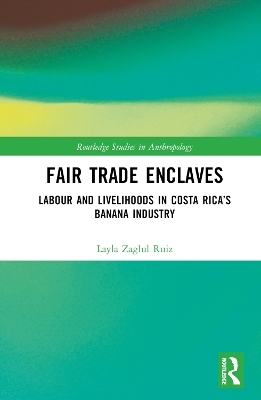
Fair Trade Enclaves
Routledge (Verlag)
978-1-032-60010-9 (ISBN)
- Noch nicht erschienen (ca. April 2025)
- Versandkostenfrei innerhalb Deutschlands
- Auch auf Rechnung
- Verfügbarkeit in der Filiale vor Ort prüfen
- Artikel merken
Fair Trade Enclaves tells the story of exploitation and inequality in the production of Fair Trade bananas. It draws on immersive fieldwork in Costa Rica, which was the original testing ground for US-owned plantations and is today the world’s third-largest exporter of bananas. The book offers an ethnographic study of Fair Trade’s impact on the ‘Dollar’ banana system and considers how the growth in Fair Trade affects workers’ livelihoods at the source of production. It documents the labour conditions and daily struggles of Costa Rican banana workers, featuring a comparative anthropological assessment of Fair Trade and conventional estates. The chapters provide a window onto Fair Trade’s ability to effect change within one of the world’s most exploitative and enduring commodity chains, exposing how Fair Trade currently fails to challenge the structural exploitation of banana production within the dollar system. The author reveals how, in some respects, workers at the conventional farm enjoy better conditions compared with those employed on the Fair Trade farm. The book is valuable reading for scholars of Anthropology, Development and Latin American Studies.
Layla Zaglul Ruiz is a Canning House Research Fellow in the Latin America and Caribbean Center at the London School of Economics, UK.
Acknowledgments 1. Introduction Disjunctions in the Fair Trade Movement Fair Trade Enclaves within Neoliberalism The Discourse of Crisis Self-exploitation and Co-ownership Research Methods and Positionality 2. Producing bananas in Costa Rica Producing Alianza (and Caché) bananas Conclusions 3. Contracts Working hours and payment Freedom of association Conclusions 4. Caché: controlling through conflict and violence Alianza: Relatedness and kindship on the shopfloor Conclusions 5. Discourse of crisis in public and private spheres The shop floor in crisis Conclusion 6. The evolution of banana quality standards Surviving the market with Extra Class bananas More restrictions, the same ‘perfect fruit’ Is first-class consumption ethical? Conclusion 7. The lack of social capital Agrofair’s modus operandi Conclusion 8. Conclusion. Index
| Erscheint lt. Verlag | 1.4.2025 |
|---|---|
| Reihe/Serie | Routledge Studies in Anthropology |
| Zusatzinfo | 2 Tables, black and white; 2 Halftones, black and white; 2 Illustrations, black and white |
| Verlagsort | London |
| Sprache | englisch |
| Maße | 156 x 234 mm |
| Themenwelt | Sozialwissenschaften ► Ethnologie |
| Sozialwissenschaften ► Soziologie ► Spezielle Soziologien | |
| ISBN-10 | 1-032-60010-1 / 1032600101 |
| ISBN-13 | 978-1-032-60010-9 / 9781032600109 |
| Zustand | Neuware |
| Informationen gemäß Produktsicherheitsverordnung (GPSR) | |
| Haben Sie eine Frage zum Produkt? |
aus dem Bereich


